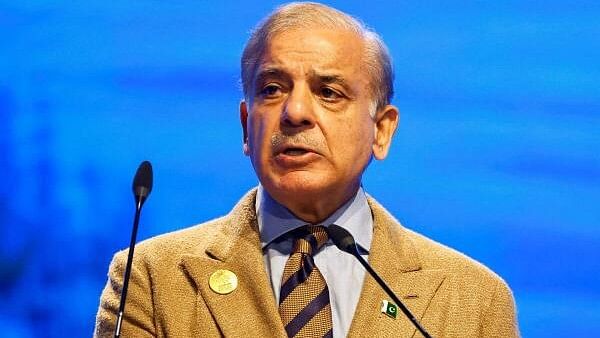
Pakistan Prime Minister Shehbaz Sharif
Credit: Reuters Photo
Islamabad: Pakistan Prime Minister Shehbaz Sharif said on Saturday that fighting terrorism was a collective responsibility of all institutions, as the country battled a resurgent Taliban militancy.
Addressing the apex committee meeting of the National Action Plan (NAP), he said provinces should also play their role in combating insurgency in the country.
The apex committee is its highest body overseeing the implementation of measures to eradicate militancy from the country.
“The responsibility of the fighting against terrorism is the collective duty and the primary obligation of all state institutions. It’s not about you and me, it’s about us. We have to trample it together,” Sharif said.
The 20-point NAP agenda to eliminate terrorism was adopted by the government and approved by the opposition parties in the wake of Peshawar school attack on December 16, 2014.
The prime minister said Pakistan has been facing terrorism for the last two-and-a-half decades and it has become complicated due to the involvement of crime, drugs, smuggling, extremism and religious terrorism.
The apex committee meeting was held as Pakistan faced an uptick in the acts of terrorism in recent years. According to an annual security report issued by the Centre for Research and Security Studies, Pakistan witnessed 1,524 violence-related fatalities and 1,463 injuries from 789 terror attacks and counter-terror operations in 2023, marking a record six-year high.
The latest wave of terrorism is led by the Pakistan Tehreek-i-Taliban (TTP), which according to Pakistan officials, has sanctuaries in Afghanistan.
Sharif acknowledged that some provinces had made progress in tackling militancy, but “it is my belief that we have all too easily left this matter to our armed forces” and both the provinces and federal government have left it for the army.
“This is that dangerous practice that has become a custom in the past years that this is the army’s job and its officers have to do this,” he said.
Sharif said provinces were paying a price but the overall sense is that the army has to fight against terrorism. He said it would not eliminate terrorism from the country.
“We cannot even hope for strong stability without a complete system or a whole-of-the-government approach. This does not only refer to all agencies and ministries but the federal and provincial governments and all institutions,” he said.
Sharif asked the political and religious leadership to be clear that this battle was for Pakistan’s survival and “we are not fighting someone else’s battle”.
The premier also said that the rule of law and stability were important for growth and development in the country. “A soft state can never gain the trust of investors,” he said, adding that a strong and healthy economy could not be envisioned in an unstable state gripped by terrorism.